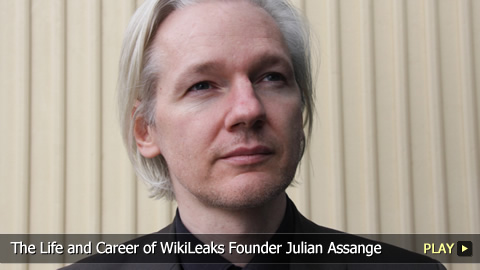The Life and Career of WikiLeaks Founder Julian Assange

advertisement
VOICE OVER: Rebecca Brayton
Born July 3rd, 1971 in Queensland, Australian, Julian Assange took his roots as a computer hacker to become the man behind WikiLeaks, one of the biggest non-profit whistleblowing organizations today. In 2011, the organization was behind one of the biggest leaks of classified documents and information ever with the United States Diplomatic Cables Leak. In this video, http://www.WatchMojo.com takes a look at the life and career of the Australian internet activist, journalist and publisher Julian Assange.
Beginnings
Julian Paul Assange was born on July 3rd, 1971 in Queensland, Australia. As a result of his nomadic family life, he attended many schools as a teenager. He started hacking under the name “Mendax” at the age of sixteen.
Computer Hacking Skills
Then, in the early 1990’s, Assange was charged for illegally accessing information from the computer systems of several organizations, but was released on good conduct shortly thereafter. He began programming and developing free software in 1994. For example, he wrote the first free and open source port scanner, Strobe, and co-created a deniable encryption archive called Rubberhose.
WikiLeaks
After dropping out of university, Assange became the editor-in-chief of WikiLeaks in 2006. The non-profit organization was set up to allow global sources to anonymously submit information that would otherwise be held private or classified. Such information, usually ethical, political or historical in nature, would then be released to the public, often through WikiLeaks’ official site.
Early Leaks
As its director, Assange has the final say on what is published and also makes public appearances on the organization’s behalf. Notable early leaks included information about the alleged illegal activities of Swiss Bank Julius Baer in the Cayman Islands, details from secret Scientology books and emails from American politician Sarah Palin’s personal email account.
2009 Leaks
In 2009, WikiLeaks published suspicious internal documents that had circulated prior to Iceland’s financial crisis from the Kaupthing Bank. It also brought to light particulars from a report concerning the dumping of toxic waste in the Ivory Coast.
War Documents
These leaks were not going unnoticed. In fact, WikiLeaks posted a report revealing that the U.S. Department of Defense were discussing the prevention of leaks by the organization in 2010. Footage from a 2007 airstrike in Baghdad, along with documents related to the war in Afghanistan earlier in the decade, were also released that year. Later on, approximately four hundred thousand classified documents pertaining to the Iraq War were leaked.
U.S. Diplomatic Cables Leak
In November 2010, WikiLeaks began the publishing of over two hundred and fifty thousand diplomatic cables from American embassies around the globe. These confidential messages dealt with numerous subjects, such as the politics of numerous countries, nuclear weapons and Middle Eastern tensions, among others.
Reactions to "Cablegate"
The highly publicized leak received mixed reactions: while some government officials criticized WikiLeaks, supporters hailed Assange as a hero. Shortly thereafter, the U.S. Department of Justice initiated a criminal investigation into the affair.
Troubles
By the end of the year, Assange faced such legal and financial troubles that he sold the publishing rights to his autobiography for almost two million dollars. Around the same time, the Swedish police issued a warrant for Assange’s arrest and extradition to Sweden while living in Britain. This was for the sexual crimes he had allegedly committed in the country in 2010. Assange has since appealed the decision.
2011
He continued to make public appearances in the next year. WikiLeaks also shared secret files connected to the Guantanamo Bay detention camp in 2011.
Awards and Recognition
Though some have accused him of being a criminal and even a terrorist, others have lauded his whistle blowing efforts and deemed him a champion of free speech. Despite detractors, Julian Assange has received several awards, including the 2009 Amnesty International UK Media Award for divulging details about the extrajudicial murders in Kenya. Even after the United States diplomatic cables leak, he was recognized with prizes such as the 2011 Martha Gellhorn Prize for Journalism.
Influence
Whether or not one agrees with Julian Assange’s methods and philosophies, there is no denying that what he has done has had a major impact on the world already and will surely affect what is to come.


 0
0
 0
0
 report
report

 0
0
 0
0
 report
report

 0
0
 0
0
 report
report

 0
0
 0
0
 report
report

